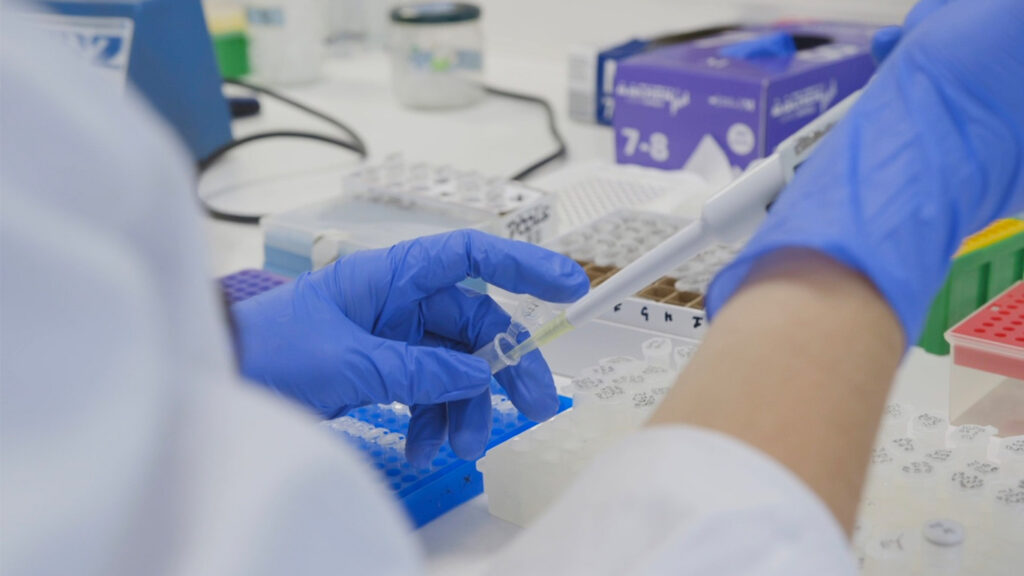IDIBELL researchers collaborate with researchers from the Liver Disease Laboratory at CIC bioGUNE, a member of the Basque Research & Technology Alliance (BRTA), that have described a new microRNA, a gene expression regulator molecule, which determines the response of patients with hepatocellular carcinoma to sorafenib, a drug for the treatment of liver cancer.
The study, led by Dr Malu Martínez Chantar of CIC bioGUNE and of the Biomedical Research Centre Network for Liver and Digestive Diseases (CIBEREHD), alongside first authors Dr Pablo Fernández Tussy, Dr Rubén Rodríguez Agudo and Dr David Fernández (CIC bioGUNE-CIBEREHD), amd with the collaboration of Dra. Isabel Fabregat from OncoBell, has been published in the journal Cell Death and Disease.
This international collaborative study has identified increased levels of miR-518d-5p (gene expression regulator molecule) in serum in patients with liver cancer. The identification of this molecule in blood is associated with increased resistance to treatment with the drug sorafenib and reduced overall survival in patients with hepatocellular carcinoma. Likewise, miR-518d-5p inhibition by genomic approaches may be related to an increase in the sensitivity of human hepatoma cells to sorafenib, as well as in preclinical experimental models of liver cancer.
“Micro-RNAs (miRNAs) are regulatory molecules of gene expression. A single miRNA is capable of modulating the expression of multiple genes involved in processes associated with the development of a multifactorial pathology. Thanks to their broad spectrum of action, these molecules could be used as new therapeutic tools for the treatment of complex diseases,” explains Dr Malu Martínez Chantar.
Sixth most common cancer worldwide
Hepatocellular carcinoma (HCC) is the sixth most common cancer worldwide and the third leading cause of cancer-related death. Despite recent progress in HCC treatment, the long-term survival and well-being of patients remain major challenges for the medical and scientific world. Although sorafenib is one of the first-line systemic drugs for HCC treatment, the direct relation between the use of this drug and the survival of those patients treated with it depends on the patients’ baseline characteristics. Therefore, recognising the specific signalling mechanisms of tumours is essential to improve and predict, in this case, the activity of sorafenib. Identifying the main causes of drug resistance would be highly beneficial to guide a personalized HCC treatment, thereby enabling an accurate stratification of patients enrolled in associated clinical trials.
Participants in this research work, led by the CIC bioGUNE Liver Disease laboratory headed by Dr. Malu Martínez-Chantar (CIC bioGUNE and the Biomedical Research Centre Network for Liver and Digestive Diseases, CIBEREHD), also include the Precision Medicine Laboratory and the Inflammation and Macrophage Plasticity Laboratory (CIC bioGUNE); Laboratory of Experimental Hepatology and Drug Targeting (HEVEPHARM), University of Salamanca; BCLC (Liver Cancer), Hospital Clínico-IDIBAPSA; the Liver Unit of the Institut d’Investigacions Biomèdiques August Pi I Sunyer; Hospital Clinic; Universitat de Barcelona/ University of Barcelona; the Northern Institute for Cancer Research, the Medical School and the University of Newcastle (Newcastle-upon-Tyne, UK); the Department of Gastroenterology, Azienda Ospedaliero-Universitaria & University of Modena and Reggio Emilia (Modena, Italy); the Department of Liver and Gastrointestinal Diseases, Biodonostia Research Institute; Hospital Universitario Donostia/University Hospital of San Sebastían, Universidad del País Vasco-Euskal Herriko Unibertsitatea/University of the Basque Country (Donostia-San Sebastián); Karsh Division of Gastroenterology and Hepatology, Cedars-Sinai Medical Center (Los Angeles, USA); TGF-β and Cancer Group, Oncobell Programme, Bellvitge Biomedical Research Institute (IDIBELL) and the University of Barcelona; Instituto de Salud Carlos III; Research Institute for Medicines (iMed. ULisboa), the Faculty of Pharmacy, Universidade de Lisboa/ University of Lisbon; IK4-Tekniker; and Ikerbasque, Basque Foundation for Science.
The Bellvitge Biomedical Research Institute (IDIBELL) is a biomedical research center created in 2004. It is participated by the Bellvitge University Hospital and the Viladecans Hospital of the Catalan Institute of Health, the Catalan Institute of Oncology, the University of Barcelona and the City Council of L’Hospitalet de Llobregat.
IDIBELL is a member of the Campus of International Excellence of the University of Barcelona HUBc and is part of the CERCA institution of the Generalitat de Catalunya. In 2009 it became one of the first five Spanish research centers accredited as a health research institute by the Carlos III Health Institute. In addition, it is part of the “HR Excellence in Research” program of the European Union and is a member of EATRIS and REGIC. Since 2018, IDIBELL has been an Accredited Center of the AECC Scientific Foundation (FCAECC).

